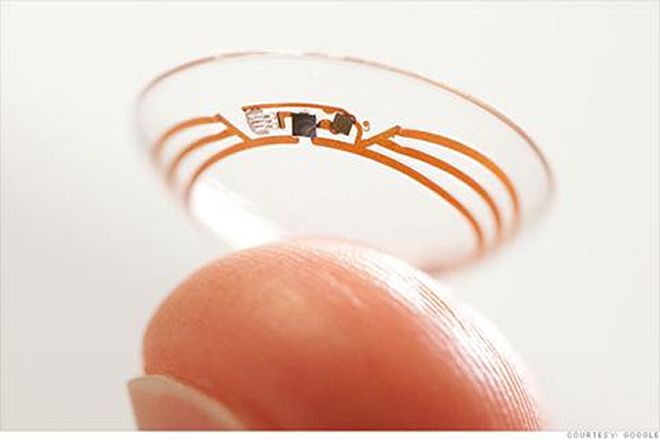Google is currently working on a development of new smart contacts that can measure the glucose levels in diabetic patients, and apparently they aren’t the first to try. According to CNN, in 2011 Microsoft partnered with the University of Washington in an attempt to make contact lenses with radio and glucose sensors. As experiments and development in Google’s X labs continues, it is questionable what this invention may add to the increasing world of technology. Other projects in the works in the Google X labs are driverless cars and other inventions that may change the world. In the contact lens are tiny chips and glucose sensors between two lenses; they are considering adding LED lights that would flash to indicate if levels were too high or low. Tears would leak into the contact lenses where levels would be measured by a tiny chip thinner than a hair. Other bodily secretions have been tested to see if they would prove more effective than tears, but so far eyes have proven the best and most efficient source to focus on. The electronics that are used in the lens are so miniscule that they seem like nothing more than specs of glitter.
“Since the eye is the only exposed organ of the body, it could be effective but they need to do some more extensive testing before putting it on the market,” Fossil Ridge High School biology and anatomy teacher Donna Widhalm said. She also believes that it would be much easier to use the contacts, especially for “the elderly so they don’t have to prick themselves.”
As diabetes is a prevalent disease both in the U.S. and around the world, the new contact lenses may prove to be a helpful and more efficient method of monitoring glucose levels for patients. As it has not been introduced, there is no mention of the cost for these contacts and how often they would have to be replenished.
Depending on if the individual is diabetic or not determines if it is even useful to wear. Many who don’t have diabetes may wear them to monitor their glucose levels in avoidance of developing diabetes, but chances are slim. Students at FRHS are more concerned if Google has stepped over the line in developing technology beyond the internet realm.
“I think it’s cool that they keep moving forward but at some point you can’t have technology do everything for you,” senior Nicole Seest said.
“I think taking the human element out of things could be dangerous but at the same time have beneficial factors,” junior Anna Bonjour said. “As for Google, as a business they should be able to do what they want and what they find profitable but within commonly accepted morals.”
As the engineering is still in production, Google is still working on the “kinks” of the system and must get approval from the Food and Drug Administration before hitting the market. As of now it is indefinite if the invention will survive the Google X lab and start production and consumption, or if the development will be decommissioned.








